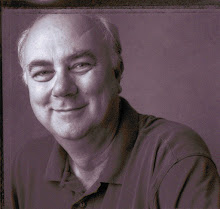Jean Nicaise caption" "The housewife who sweeps the
sidewalk could never be an American!"
Memories of a Caroloregian: the
Kingsport pages
by Jean Nicaise who was a Fulbright exchange teacher at Dobyns-Bennett during the 1958-1959 school year.
Translator's note: Square brackets
[ ] enclose clarifications or explanations.
[Sic] means the previous word appears as per the original. Italics show
when Nicaise himself uses English.
First days in Kingsport
We
are far from imagining such a dark future on August 28, 1958, when we arrive in
Kingsport.
On
the way to Mary Johnson's house, the air we breathe is pretty disagreeably
polluted. The smell of acetone lessens some in the residential neighborhood,
which looks the same as those in all small American cities.
Movies
have made them familiar. East Wanola Street, where Mary's modest house is built,
is no exception to the rule: a street bordered with maple, sycamore, and locust
trees that sing a symphony of colors every October (Indian summer); houses of
whitewashed wooden boards sitting in the middle of a lawn. No fences between
the yards.
[Here
there is a picture of Nicaise's wife Renee sweeping the sidewalk, with the
caption, "The housewife who sweeps the sidewalk could never be an
American!" A second picture with no caption shows Nicaise himself in front
of the house.]
After
crossing the usual porch, you go directly into the living room through the
protective screen door [literally "mosquito" door].
This
arrangement produces the first comedy act of our stay.
In
spite of the supposed Prohibition, Mary immediately offers us a whisky, the
first one Renee has ever drunk. And at this precise moment someone rings the
doorbell.
-
Oh my god, says Mary, I forgot: it's the laundry man. He's also the deacon of a
church. Quick, hide your glass! The law isn't strictly enforced, but a teacher
oughtn't scandalize a man of God.
The
laundry delivery man enters. There are introductions. "Professor etc.
…"
-
Ah, glad to meet you. What's your Church?
The
question is addressed to Renee, who understands perfectly but who panics at
being asked something that, where we come from, is considered an abnormal
indiscretion. She says to me in French:
-
Jean, he's asking me what church we go to! What do I say?
We
know that it's unseemly in America to say that you have no religion. Isn't the
country's motto, engraved in stone over the seats of judges and printed on
paper money, "In God we trust," which means that "We place our
confidence in God," or that "We rely on Him"?
I
respond on behalf of my flustered wife:
-
Any.
I
think that I'm translating "aucune," [none] which is the truth
perhaps better left unsaid. But while I think I am boldly demonstrating my
frankness, in fact I've forgotten one of the subtleties of the English language
and the good lessons of my teachers. "Aucune" means not any,
(adjective) or none, the pronoun. I quickly realize that I have answered
"any of them," because next the laundry employee is smiling and
saying:
-
Then you can come to mine …"
From
this moment forward, on the advice of Mary, who apparently doesn't go to
church, and also since luck has bestowed upon me a neutral response, I give
this same answer anytime anybody asks What's your church so they won't think
bad of me. It's one of the first questions lots of people ask after they've
told you their first and last name. My answer always gets the same invitation:
Then, come to mine! It would be unseemly
to reveal that we are unbelievers.
In
a city of 60 thousand inhabitants, or thereabouts, there are 42 churches,
including only one Catholic church, Saint Dominic. The others are one or another
of the different Protestant varieties: Baptist, Methodist, Presbyterian,
Lutheran, Episcopal (similar to Church of England), Mormon. There is a Church
of Jesus Christ, a Church of Christ, the likes of which could raise doubts as
to whether the others worship the Redeemer at all. There is a First Church of
God, which in spite of its claim was the last one built and one of the least
attended, competing with a First Christian Church and also the First Assembly
of God. Here I'll stop my very incomplete list. The Chamber of Commerce gives
the number of members of each church along with an assessment of its wealth.
The most frequented and also the wealthiest ($289,000 in 1958) is First (yes,
yet another "First") Baptist. The First Pentacostal [sic] Holiness
has the fewest members (25) but isn't the poorest ($6,000), which is Morisson
[sic] City Christian with $5,000 despite its 80 members.
We
do accept some invitations, at first out of politeness and then for pleasure,
because it is part of the experience of our stay. Moreover, I enjoy the
congregational singing. Absorbed in the given selection, sometimes I sing
along. It also registers with me that such an invitation is a sign of respect.
Sunday church attendance is a worldly event. After the service, while the
children learn their catechism in Sunday School, everybody drinks coffee and
nibbles cookies. Unfortunately it's not possible for me to go to a black
church, whose style and rhythms I would have enjoyed. My white hands would
certainly have clapped along with the black ones. But whites and blacks would
have found my presence to be incongruous and probably suspect.



0 Comments:
Post a Comment
<< Home